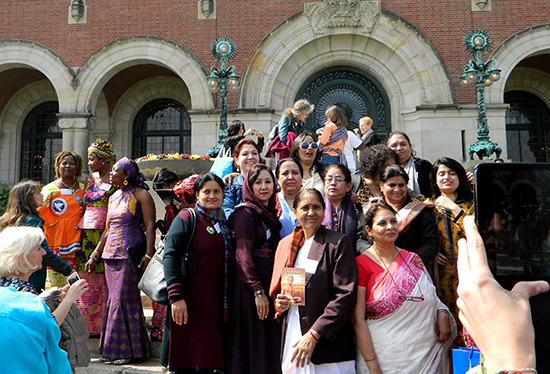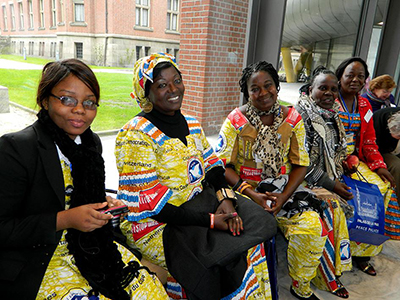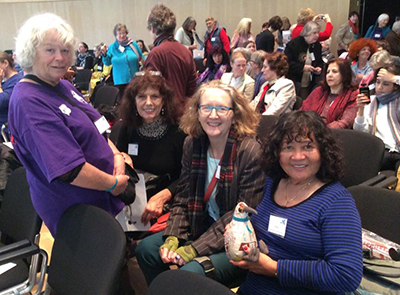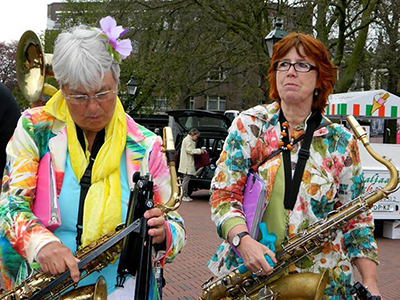
How does an international women’s organisation with a hundred year history put Mahatma Gandhi’s famous call to action into practice in 2015? Marion Bowman reports on the success of the centenary congress of the Women's International league for Peace and Freedom (WILPF) from The Hague, Netherlands.
ANALYSIS: "Be the change that you wish to see in the world". . .
How does an international women’s organisation with a hundred year history put Mahatma Gandhi’s famous call to action into practice in 2015? Especially one subject to the plurality of analysis of its diverse membership, which puts patriarchy or capitalism or class or nationalism or racism or other "dominant systems" in the frame as the main reason for the need for change, depending on whose view prevails.
Putting these sources of oppression in competition with each other as the main problem for women or the main causes of war and conflict is as old as 20th and 21st century feminism, and many a women’s initiative has floundered in long drawn-out and failed attempts to settle the argument.
When it’s a women’s organisation promoting peace, the responsibility to strike an agreement about central principles rather than descend into self-defeating conflict is heavy. At the Women’s International League for Peace and Freedom (WILPF) meeting in The Hague, Netherlands, for their centenary congress, 130 women from 28 countries managed to pull it off.
 WILPF is the world’s oldest international women’s peace organisation whose global span encompasses 36 different countries. On the second day of their meeting, their chief concern was the shape they themselves are in: the need to renew their organisation at the start of their second century by updating and clarifying their own constitution and how they govern themselves, and the need to re-state their principles and purposes.
WILPF is the world’s oldest international women’s peace organisation whose global span encompasses 36 different countries. On the second day of their meeting, their chief concern was the shape they themselves are in: the need to renew their organisation at the start of their second century by updating and clarifying their own constitution and how they govern themselves, and the need to re-state their principles and purposes.
Margrethe Tingstad, from Norway, offered a useful thought to those taking up potentially opposing positions in the long hours of discussion: "A different view is just a view from a room I have not yet been in," she said.
New manifesto
Democracy can be a slow, unwieldy beast. In The Hague yesterday, appropriately enough in the Academy of International Law in the Peace Palace, WILPF’s congress decided against updating their constitution. But after eight years of internal discussion, work, drafting, disagreement, compromise and creativity, the members did adopt a new manifesto for the 21st century.
The manifesto, to be published tomorrow, exactly 100 years to the day since the organisation was founded in this same city, is a statement as much about the indomitability and resilience of a global movement of women as it is about how to stop war in a world where war seems to be accepted as being as inevitable as the weather.
It restates the organisation’s purposes: to bring together diverse women of a range of political beliefs and philosophies united in determination to stop current wars, and to study, make known and help abolish the root causes of war and the factors that are used to legitimate it; to campaign for total and universal disarmament and demilitarisation; to advocate the outlawing of the use of coercive force to resolve conflicts; and to imagine peace, and work to bring it about.
The 15-page document was overwhelmingly passed by the delegates but not without some tricky moments. The patriarchy versus capitalism battle took centre stage with delegates arguing the relative de-merits of Beelzebub and Lucifer.
Capitalism’s transformation since 1915 was key said one Spanish delegate. "The face of war now is the new economic order that is increasing financial freedom rather than meeting human need. But we need to make patriarchy understandable and visible because it is at the core of capitalism, of financial power and the war system. Patriarchy is part of our daily lives."
A US delegate said the capitalism of her own country, the richest in the world, was like an octopus that was strangling the life out of the planet.
"We need a worldwide discussion about how we are going to stop this octopus and have the world’s grandeur for everyone," she said.
More radicalism
A Swedish woman said: "Capitalism is taking over the whole world. It is taking our labour and giving it to the banks and to rich people. We have to create a movement against it."
Many delegates wanted more, and more diverse, radicalism. "The manifesto is not strong enough, it doesn’t express sufficient urgency," said one. A New Zealander took the point up. "In tandem with statements about social and economic policies that are stripping us of potential, we feel a sense of urgency about the earth."
"The manifesto is not strong enough, it doesn’t express sufficient urgency," said one. A New Zealander took the point up. "In tandem with statements about social and economic policies that are stripping us of potential, we feel a sense of urgency about the earth."
"I miss the word 'fascism',’ said a Dutch delegate. "It is strong and growing. What is fascism? It is a world of fear and that is what we are living in."
Others scaled down from the planet as a whole to specific groups and issues. "We need more about indigenous people." "We need more on the 'global south'. "The issue is exclusion. Patriarchy is a binary gender system, it excludes trans people".
"Men are victims of patriarchy too," said a Nepali delegate. "Women can be patriarchal too. It is about a traditional and orthodox mindset." "WILPF is being ageist in what you ask of young women."
A small number of delegates wanted to focus on the most difficult challenge: not analysing the causes of war and the sorry state of the world, but imagining and creating peace.
Offering a vision
"We are not just claiming things," said one. "We have many things to offer; we are offering a vision."
One of the most thoughtful interventions came from Dierdra McMenamin, from Northern Ireland, a woman with 20 years of creative peace work. She imagined something quite different.
"'The manifesto uses the language of war and we should perhaps translate it into the language of peace," she said. "It is a male paradigm. In a way, we are doing what men do and we need to do something different. They will always be better at it than us."
"When you are anti-war you create a vacuum," she went on. Peace is not just the absence of war.
"We need processes that create peace." In Northern Ireland, through an art project, McMenamin brought the men of violence into a space with children to begin an essential healing process, both for individuals and communities.
"A lot of people who go to war eventually need to heal themselves," she said. Her own work is to concentrate on creation directly addressing the harm caused by destruction.
 WILPF accepted that creating a manifesto that works for the common good, being themselves the change they want to see in the world, was what was at stake.
WILPF accepted that creating a manifesto that works for the common good, being themselves the change they want to see in the world, was what was at stake.
Chaotic world
"The world is in chaos. There are few international institutions that we can rely on that are democratic and accountable," said a Swedish delegate as WILPF’s manifesto reached the crucial vote, and the organisation’s own democratic habits were tested.
Attention was turning to the essential acts of creation that would follow the manifesto’s adoption.
"Agreeing this manifesto is not the end, it is the beginning," she said, a point echoed by WILPF’s secretary-general Madeleine Rees: "This is a rallying cry. We can go forward with it into the next century."
Edith Ballantyne, the 92-year-old doyenne of the WILPF peace women, said: "This is not a dream, it is who we are."
Finally getting the "yes" vote on such a major document, with no blood on the floor, was probably what Gandhi would have had in mind.
Marion Bowman is reporting from WILPF's centenary international civil society conference in the Hague, 22-29 April. Read read more articles in the 50.50s series Women's Power to Stop War



